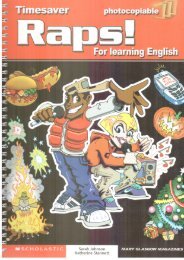English_Book_2-Teacher_300913
English_Book_2-Teacher_300913
English_Book_2-Teacher_300913
You also want an ePaper? Increase the reach of your titles
YUMPU automatically turns print PDFs into web optimized ePapers that Google loves.
Fun with grammarUnit 1, 6 Practice, page 8Focus on multiple intelligences: this activityfocuses on kinesthetic and auditory intelligences.• Have students do this activity with theirbooks closed.• Have students stand up and form groups of six.Tell each group to choose a leader. Have the leaderin each group open his or her book and look at thelist of commands.• Explain to the groups that they will play a game.The group leader will give commands and theymust follow them. Tell them that if someone isunable to perform the action, that person is outof the game and must sit down. Have one groupmodel giving one or two commands. Beforegroups begin, check that students know shake ahand, put (something) down, laugh, and wave.• Walk around to monitor as groups play the game.Congratulate students who are still standing at theend of the game.Unit 2, 10 Practice, page 18Focus on multiple intelligences: this activityfocuses on kinesthetic intelligence.• Have students do this activity with theirbooks closed.• Bring a very soft ball to class. Have students standup and form a circle. If you have a large class, youmay want to bring several balls and have studentsform several circles.• Explain to the students that they will play a game.One student will ask a How often question andtoss the ball to another student. The other studentwho catches the ball must answer the question.Then that student asks a How often question andthrows the ball to another student. You may wantto elicit some vocabulary students can use in theirquestions; write it on the board if helpful.• Ask the first How often question yourself andthrow the ball. Direct the first few rounds of theactivity if needed. Encourage students to pickup the speed of the questions and answers as thegame proceeds.Unit 3, 4 Practice, page 25Focus on multiple intelligences: this activityfocuses on logical and auditory intelligences.• Have students do this activity with their booksclosed. To make sure the exercise proceedssmoothly and easily, create a list of 10 to 20sentences with mystery words before class.• Divide the class into two or more teams. Assign arepresentative for each team.• Explain how to play the game. On the board, writeyadda yadda. Tell students this is the mystery wordand they must guess its meaning. Tell them thatyou will say a sentence. They should listen to theother words in the sentence to guess the meaningof yadda yadda. Give students an example sentence:On weekends, I often go with my family to the yaddayadda. We usually don’t buy anything. We just walkaround and go from store to store. Tell students theycan discuss the meaning of the word with theirteam members. When they know what yadda yaddameans, the team leader should raise his or herhand.• Call on the first representative who raises his orher hand. If the answer is correct, give the teama point. If the answer is wrong, give the otherteam(s) a chance to take the point. If all teamsfail to guess the mystery word, create anothersentence using the same word; for example, Theyadda yadda in my town has lots of cool stores andreally good restaurants.• For the next turn, assign a new representative foreach team. Continue until time is up or all wordshave been guessed.TEACHER’S NOTEST68:04:17 PMPostcards_splitB_TE1_BM_62-70.inT68 T682/27/07 10:21:58 AM




